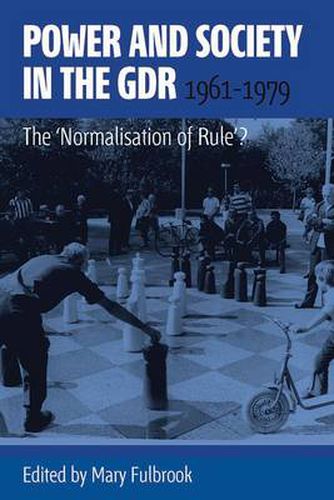Readings Newsletter
Become a Readings Member to make your shopping experience even easier.
Sign in or sign up for free!
You’re not far away from qualifying for FREE standard shipping within Australia
You’ve qualified for FREE standard shipping within Australia
The cart is loading…






The communist German Democratic Republic, founded in 1949 in the Soviet-occupied zone of post-war Germany is, for many people, epitomized by the Berlin Wall; Soviet tanks and surveillance by the secret security police, the Stasi, appear to be central. But is this really all there is to the GDR(1)s history? How did people come to terms with their situation and make new lives behind the Wall? When the social history of the GDR in the 1960s and 1970s is explored, new patterns become evident. A fragile stability emerged in a period characterized by ‘consumer socialism’, international recognition and detente. Growing participation in the micro-structures of power, and conformity to the unwritten rules of an increasingly predictable system, suggest increasing accommodation to dominant norms and conceptions of socialist ‘normality’. By exploring the ways in which lower-level functionaries and people at the grass roots contributed to the formation and transformation of the GDR
from industry and agriculture, through popular sport and cultural life, to the passage of generations and varieties of social experience
the contributors collectively develop a more complex approach to the history of East Germany.
$9.00 standard shipping within Australia
FREE standard shipping within Australia for orders over $100.00
Express & International shipping calculated at checkout
Stock availability can be subject to change without notice. We recommend calling the shop or contacting our online team to check availability of low stock items. Please see our Shopping Online page for more details.
The communist German Democratic Republic, founded in 1949 in the Soviet-occupied zone of post-war Germany is, for many people, epitomized by the Berlin Wall; Soviet tanks and surveillance by the secret security police, the Stasi, appear to be central. But is this really all there is to the GDR(1)s history? How did people come to terms with their situation and make new lives behind the Wall? When the social history of the GDR in the 1960s and 1970s is explored, new patterns become evident. A fragile stability emerged in a period characterized by ‘consumer socialism’, international recognition and detente. Growing participation in the micro-structures of power, and conformity to the unwritten rules of an increasingly predictable system, suggest increasing accommodation to dominant norms and conceptions of socialist ‘normality’. By exploring the ways in which lower-level functionaries and people at the grass roots contributed to the formation and transformation of the GDR
from industry and agriculture, through popular sport and cultural life, to the passage of generations and varieties of social experience
the contributors collectively develop a more complex approach to the history of East Germany.